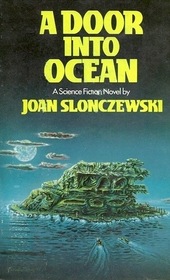Helpful Score: 1
A Door Into Ocean resembles some of the earliest same-sex utopias in that it's written mainly, though not entirely, from the POV of outsiders, two out of three of whom are male. The premise is that some time in the quite distant past, some female space travelers settled this planet whose surface is nearly entirely water. It's called Shora. (The names in this novel are not very subtle.) The people who live on Shora call themselves Sharers, and they are tall, hairless all over, have webbed fingers and toes, and are purplish-blue.
The Sharers have a very different culture from anyone else, and they are finding attempts to interact with the people from other planets traumatic. They have no hierarchy, no authority, no warfare. Their entire planet is set up to be in perfect balance, and they make all decisions in Gatherings. I know this sounds nauseating, but the author is more than competent at drawing individual characters with conflicts and she doesn't make the Sharers into horrible plaster saints. Their dilemma is whether to consider the others human. Some of this is because some others are male, which is freakish to them, but mainly it's the willingness to hurt others that they think is not human.
She does make the other planet dwellers pathetic patsies an empire ruled by a Patriarch. They have issues with hierarchy, warfare, capitalism, ethnic rivalry, social inequality, and just plain Bad Sex (TM.) You can see how the author was influenced by the world she grew up in--the scenes of the darker purple people facing the lighter non-purple people with complete non-violence are compelling.
The Sharers have a very different culture from anyone else, and they are finding attempts to interact with the people from other planets traumatic. They have no hierarchy, no authority, no warfare. Their entire planet is set up to be in perfect balance, and they make all decisions in Gatherings. I know this sounds nauseating, but the author is more than competent at drawing individual characters with conflicts and she doesn't make the Sharers into horrible plaster saints. Their dilemma is whether to consider the others human. Some of this is because some others are male, which is freakish to them, but mainly it's the willingness to hurt others that they think is not human.
She does make the other planet dwellers pathetic patsies an empire ruled by a Patriarch. They have issues with hierarchy, warfare, capitalism, ethnic rivalry, social inequality, and just plain Bad Sex (TM.) You can see how the author was influenced by the world she grew up in--the scenes of the darker purple people facing the lighter non-purple people with complete non-violence are compelling.
Helpful Score: 1
Very interesting right from the start. Loved this book right up to the end.




